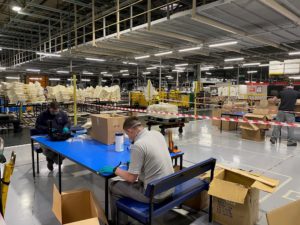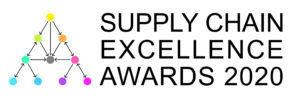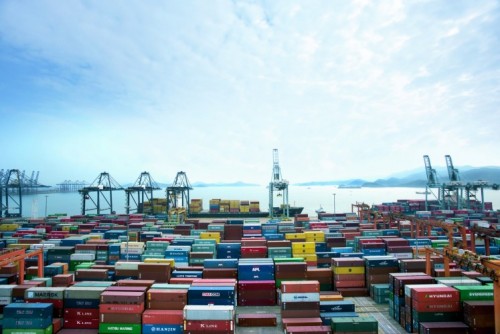From coronavirus to Brexit, sustainability to e-commerce market, risk management is at the centre of a stable chain. How supply chain practitioners cope with these dangers depends on how robust risk management systems are. The world is heading in a new direction and supply chains need to be able to survive in order to overcome any challenges. Michelle Mooney investigates.
When coronavirus first hit in China, the major worry was of supply chain disruptions due to the forced closure of various factories. As the pandemic has spread it has led to panic stockpiling by consumers and shortages, in the UK at least, of products like toilet paper and soap.
With the FTSE 100 losing a third of its value in the space of a month (32.9% between 16 February and 16 March) Madhav Durbha, group vice president, industry strategy at LLamasoft says that there is a major lesson we can learn and that is the world’s “deep interdependency” on China.
 “As much as nearshoring has picked up, when you traverse through the bills of material, China remains a critical source of supply,” he says. “A typical car has 30,000 components, many of which are sourced from China. China also supplies 40% of API’s (Active Pharmaceutical Ingredient) to the global pharma world. Equally important is China supplies 80% of key starting materials (chemicals in API) to India. This means 70% of all APIs across the world are supplied by China. These are just two industries. This highlights the single threaded nature in which today’s supply chains operate.”
“As much as nearshoring has picked up, when you traverse through the bills of material, China remains a critical source of supply,” he says. “A typical car has 30,000 components, many of which are sourced from China. China also supplies 40% of API’s (Active Pharmaceutical Ingredient) to the global pharma world. Equally important is China supplies 80% of key starting materials (chemicals in API) to India. This means 70% of all APIs across the world are supplied by China. These are just two industries. This highlights the single threaded nature in which today’s supply chains operate.”
Dorothee Schramm, partner at Sidley Austin, explains that “countless supply contracts” are being disrupted by factory shutdowns in the areas of China most affected by Covid-19.
She says that as the outbreak unfolded, Chinese agencies and chambers of commerce have issued thousands of force majeure certificates to Chinese companies. However, she says, Covid-19 will not give rise to a valid force majeure defence under every contract and in every circumstance, as different contracts and governing laws stipulate different requirements for different situations: “Companies are therefore well advised to proactively manage the related legal risk and carefully assess which party must ultimately bear the financial losses caused by Covid-19.”
They also say that companies should attempt to overcome any supply problems promptly, as many contracts and governing laws exclude a force majeure defence if you can overcome the consequences of the force majeure event.
Unforeseeable Circumstances
![]() “Often, you cannot rely on a force majeure defence to avoid significantly higher costs of supplying alternative goods, unless you are entitled to invoke hardship (which is rare under most governing laws). If you receive a force majeure declaration that you consider invalid, you are obligated to take steps to mitigate your damages. Document all your efforts to overcome the supply problems, particularly if they are unsuccessful.”
“Often, you cannot rely on a force majeure defence to avoid significantly higher costs of supplying alternative goods, unless you are entitled to invoke hardship (which is rare under most governing laws). If you receive a force majeure declaration that you consider invalid, you are obligated to take steps to mitigate your damages. Document all your efforts to overcome the supply problems, particularly if they are unsuccessful.”
Schramm says that if companies are affected by the coronavirus, then supply chain managers need to “understand the reasons why [they] are unable to supply.” She says they should ask questions such as: “Is it due to government-ordered factory shutdowns or quarantines, staff illness, staff staying home out of fear or other reasons?
“Identifying the exact nature of the problem is critically important and you should secure evidence proving the cause of your specific problem,” she says, adding that understanding where the problem lies in an uncertain circumstance is vital to protecting the supply chain.
Richard Wilding, professor of supply chain strategy at Cranfield University believes that forming a lean system may help to mitigate risks, like the coronavirus, therefore better preparing businesses for unforeseen circumstances.
“Events like Covid-19 serve as a wake-up call to businesses with extended supply chains,” he says. “After a dash to globalise supply chains, many of the world’s largest manufacturers have reflected on their strategy and are moving to shorten supply chains to reduce risk.
“Organisations seem to have little understanding as to how decisions at a strategic, tactical or operational level impact on the risk profile of supply chains. For instance, adopting a lean practice changes the risk profile of supply chains, with the focus on just-in-time practices resulting in a greater vulnerability to supply chain disruption when events such as earthquakes, floods or viruses like Covid-19 occur.”
To that end, he says, the coronavirus outbreak has shifted the issue of supply chain risk from the desk of supply chain directors to the executive board room. This means that competition is not between individual companies, but the supply chain networks that they are part of.
Black Swans
 However, Jeremy Hammant, senior business adviser at BearingPoint, says that despite coronavirus fears, companies are still expanding their reach.
However, Jeremy Hammant, senior business adviser at BearingPoint, says that despite coronavirus fears, companies are still expanding their reach.
“Across all sectors of business, companies are extending their geographical reach and influence. Driven by consumer power and economic growth, enabled by free trade and advances in technology, there are major opportunities for developing global supply chains to meet the changing requirements of a global customer base.”
But, he argues, while the development of global supply chains has grown exponentially over the past decades the inherent supply chain risks have been largely ignored. Global sourcing, Hammant says, implies long distance supply chains with extended lead times that have major implications for security of supply: “Many supply chain management strategies have focused on streamlining, efficiency and cost control to achieve competitive advantage – but how do these initiatives support a robust supply chain?
“While lean supply chain initiatives promise the means to achieve major savings through “just in time” systems and processes, focusing on lean can have unforeseen consequences as supply chains become increasingly vulnerable to disruption,” he says.
It is expected that supply chains can face various shocks, and Hammant suggests that the risk of these shocks is low. “In normal circumstances each node and connection in the supply chain ecosystem is subject to a statistically low incidence of unexpected and undesired shocks.
“The accumulated consequences of the ‘risks’ of these unexpected and undesired shocks occurring is still a low incidence, albeit increased from the consideration of just a single node and its connections.” However, he adds that when a shock like the coronavirus occurs, it can throw the whole system off. Which is why supply chain professionals need to be more prepared in the future. He says: “When a ‘black swan’ shock on the scale of the coronavirus occurs it has the potential to upset the workings of a myriad of ecosystems.
“Whilst such shocks are rare, they highlight a key role of supply chain management to identify and ‘manage to mitigate’ structural risk within extended supply chains,” he says. “This role is often overlooked, and very few organisations have visibility of their supply chain ecosystem let alone the tools to identify, assess and manage risk. There are many types of risk in the end-to-end supply chain.”
He clarifies that although planning for such an event would be “difficult”, it is more than worth it: “A risk that is visible may (not necessarily can) be managed, minimised and perhaps even eliminated; an unseen risk is far more dangerous, only enabling it to be tackled when having perhaps occurred to its full effect. External risks are, by definition, potentially greater than internal ones – you know less about them.”
Technology shock
 Risk management is one of the four pillars of supply chain strategy, alongside collaboration, design and engineering and culture and agility. These, say Wilding, depend on a foundation of an effective supply chain strategy and product design where the supply chain is considered to improve resilience.
Risk management is one of the four pillars of supply chain strategy, alongside collaboration, design and engineering and culture and agility. These, say Wilding, depend on a foundation of an effective supply chain strategy and product design where the supply chain is considered to improve resilience.
“We’ve seen this with car companies like BMW who, after the 2011 tsunami in Japan, altered supplier selection approaches to ensure greater resilience.”
Within that LLamasoft’s Durbha argues that “traditional models to manage risk are relatively adhoc. Organisations, he says, for the most part are reactive to risks than anticipating them.
“However, this no longer works in the 2020s. Organisations should build the predictive capabilities to test the robustness of their systems. Digital twins that model the physical interconnected supply networks are important to drive simulations that test the supply chains for a variety of risks.”
Technology can be a utilised to soften the blow of “shocks”, as Durbha notes: “Traditional supply chain technology is built around structured data that is confined to the four walls of the enterprise and at best includes some of the key supplier and customer data. Also, traditional models of supply chain decisions are built on static assumptions and policies of the supply chain.”
However, Durhba says, AI can help harness the power of unstructured and structured data that is sourced from beyond the traditional ERP systems. AI algorithms also have a learning paradigm, thus making the assumptions and policies far more dynamic as the algorithms learn from the decisions executed and the results thereof and self-correct. Hence AI will be very relevant in SCRM.”
John Manners-Bell, chief executive of Transport Intelligence says “It is impossible for supply chain managers to predict low probability, high impact events such as coronavirus. However, it is possible for supply chains to be made more resilient – or risk agnostic – by adopting a series of measures, including implementing international standards of risk awareness and response; improving visibility to lower tier suppliers; and starting to measure risk so that decisions on appropriate levels of inventory can be made.
“In the coming decade, governments, manufacturers, retailers, along with the vast array of their suppliers, logistics operators, technology partners and insurance providers will all play a role in developing the structures and processes needed to increase resilience.”
 The 24th Supply Chain Excellence Awards, with new categories for 2020, will take place on 12 November. For more information, including how to enter and sponsorship opportunities, contact daniel.jessop@akabomedia.co.uk
The 24th Supply Chain Excellence Awards, with new categories for 2020, will take place on 12 November. For more information, including how to enter and sponsorship opportunities, contact daniel.jessop@akabomedia.co.uk







